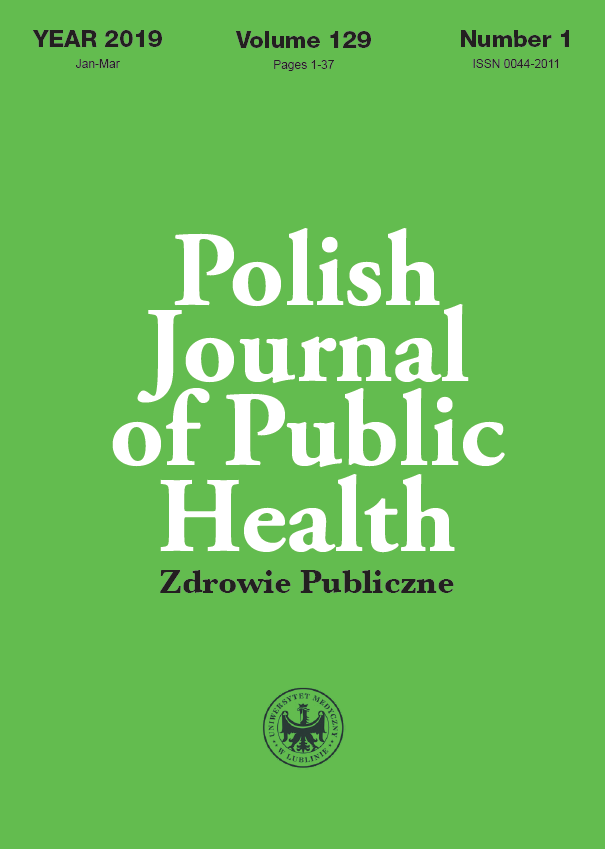A psychological analysis of factors affecting acute pain in postoperative patients
DOI:
https://doi.org/10.2478/pjph-2019-0002Keywords:
postoperative pain, acute pain, pain experience evaluation, feeling ilAbstract
Introduction. The most frequent type of acute pain is the postoperative pain. The postoperative situation consists of three stages: the preoperative stage, the surgical phase, and the postoperative stage. Each of the stages is equally important, and it is crucial that medical staff should minimize the stress and discomfort related to hospitalization. Specialists suggest that the preparation to surgery should correspond to the patient’s style of responding to stress. The level of individually experienced pain depends not only on the type of surgery, but also on psychological factors and the patient’s personality traits.
Aim. The aim of the study was to analyze the factors that affect the experience of acute pain in postoperative patients.
Material and methods. The study was conducted in Lublin, Poland, and comprised 100 patients of the local surgical wards. After incomplete tests were excluded, the group of 68 patients (37 women and 31 men, aged 20-73) was selected. The following test methods were used: The McGill Pain Questionnaire (MPQ) by R. Melzack, Test Noo-dynamiki [The Test of Noo-Dynamics] (T.N-D) by K. Popielski, Kwestionariusz Poczucia Odpowiedzialności [The Sense of Responsibility Questionnaire] (KPO) by L. Suchocka, The IPAT Anxiety Scale Questionnaire (Self Analysis Form) by R.B. Cattell.
Results. The study results show that the evaluation of pain is affected, at the statistically significant level, by the patients’ subjective experience of feeling ill, their surgery-related discomfort, and the intensity of pain. The patients who are not oriented towards future goals and tasks, closing upon themselves, evaluate the postoperative situation as difficult and distressing. The orientation towards new goals motivates the patients to fast recovery.
Conclusion. The test results confirmed the research hypotheses. The study findings may be useful for medical professionals interested in the functioning of an individual in the situation of disease.
References
1. Wordliczek J. Ból pooperacyjny. In: Wordliczek J, Dobrogowski J (eds). Ból ostry. Kraków: Wydawnictwo UJ; 2001.
2. Jurczak A, Kiryk A, Kotwas A, et al. Ocena jakości opieki pielęgnacyjnej
3. w zakresie bólu pooperacyjnego. Fam Med Primary Care Rev. 2015;17(2):107-10.
4. Dobrogowski J, Wordliczek J (ed). Medycyna bólu. Warszawa: Wydawnictwo PZWL; 2005.
5. Misiołek H, Cettler M, Woroń, J, et al. Zalecenia postępowania w bólu pooperacyjnym. Ból. 2014;15(3):22-50.
6. Rychlewski D, Wojczys R. Ból po operacji przepukliny pachwinowej. Chir Pol. 2007;9(3):180-5
7. Nowakowski P, Jurszewicz P. Medycyna okołooperacyjna – strategie redukcji ryzyka. Fam Med Primary Care Rev. 2014:16(3):313-6.
8. Golec A. Ogólna charakterystyka bólu ostrego. In: Wordliczek J, Dobrogowski J (eds). Ból ostry. Kraków: Wydawnictwo UJ; 2012.
9. de Walen-Gałuszko K. Psychologiczne aspekty bólu i jego leczenia. Med Paliat Prakt. 2007;1(2):66-70.
10. Suchocka L. Psychologia bólu. Warszawa: Wydawnictwo Difin; 2008.
11. Przybyłko K. Psychologiczne aspekty leczenia bólu. Summarium. 2016:45(65):71-88.
12. Sedlak K. Czynniki psychologiczne a odczuwanie bólu. In: J. Dobrogowski, M. Kuś, K. Sedlak, et al. Ból i jego leczenie. Warszawa: Wydawnictwo PZWL; 1996.
13. Dobrogowski J, Sedlak K. Ocena kliniczna chorego z bólem przewlekłym. In: J. Dobrogowski, M. Kuś, K. Sedlak, et al. Ból i jego leczenie. Warszawa: Wydawnictwo PZWL; 1996.
14. Popielski K. Noetyczny wymiar osobowości. Lublin: Redakcja Wydawnictw KUL; 1994.
15. Suchocka L. Psychologia odpowiedzialności w zdrowiu i chorobie. Warszawa: Wydawnictwo Difin; 2011.
16. Siek S. Osobowość. Warszawa: Wydawnictwo ATK; 1982.
17. Mimic A, Bantel C, Jovicic J, et al. Psychological factors as predictors of early postoperative pain after open nephrectomy. J Pain Res. 2018;11:955-66.
18. Berghmans JM, Poley MJ, van der Ende J, et al. Association between children’s emotional/behavioral problems before adenotonsillectomy and postoperative pain scores at home. Pediatr Anesth. 2018;28(9):803-12.
Downloads
Published
Issue
Section
License
Copyright (c) 2019 Polish Journal of Public Health

This work is licensed under a Creative Commons Attribution-NonCommercial-NoDerivatives 3.0 Unported License.


